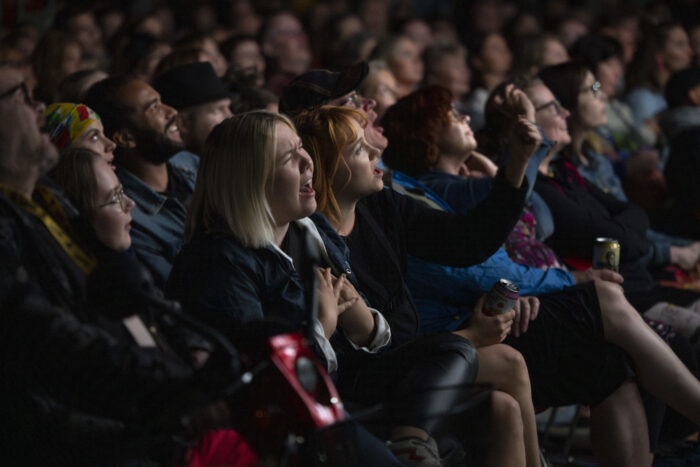The second day of the festival started warmly.
The award-winning Ukrainian director Sergei Loznitsa opened the Morning Discussion series. Along with cinema, the discussion dealt with political and social issues that Loznitsa largely focuses on especially in his later works. The director talked about his youth in Kyiv and his experience of how humiliating the Soviet system could be.
The discussion also touched upon mathematics and music which – according to Loznitsa – shed light on the order of the universe. Along with the unique soundscape, music also plays an important role in Loznitsa’s films. The Natural history of Destruction shown on Wednesday made an impression with its music and soundscape. The unfortunately topical symphonic documentary based on archive material will be screened again on Sunday morning at Cinema Kitinen.
Other screenings of Loznitsa’s films include the mockumentary My Joy and The Kiev Trial. In the Fog was shown in Friday afternoon at the Big Tent and A Gentle Creature will be screened on Saturday morning.
The children’s screenings started on Thursday in the small tent with the Finnish classic Minttu & Vanttu and the Baltic Masters of Animation. In the childcare the little guests got to play and made a Spider Man among other things!
At noon the audience fled from the burning sun to Kitisenranta School to see Veljko Vidak’s documentary Cinéma Laika presented by the Croatian director himself. Cinéma Laika premiered in the Midnight Sun Film Festival and is Vidak’s first feature length film. The warm and touching documentary follows the birth of a cultural oasis in Karkkila where Aki Kaurismäki and writer Mika Lätti start a cinema called Kino Laika that quickly gains a cult following.
Cinema Kitinen screened the Master Class film Happiness Comes at Nine o’Clock by Nikola Tanhofer. Like in a fairytale Happiness and Regret float down from the sky one day bringing with them a magic cloak that will make the owners deepest desire come true, but you have to be careful what you wish for. The film is considered Tanhofer’s great masterpiece.
In the evening director István Szabó’s 25 Fireman’s Street was screened at School as part of the Architecture Special. The film peeks into the collective and private memories of the inhabitants of an apartment building in Budapest that will be demolished the next day and shows 50 years of the building’s history over one night.
In the evening the audience filled the Big Tent almost to the brim to see Juha Suonpää’s sincerely touching and delightful documentary Lynx Man that made the spectators tear up with both joy and sadness. The film shows footage from tens of trail cameras that capture fauna of a local forest and especially the lynxes, previously thought to be extinct in the area. The protagonist of the documentary Hannu Rantala meets the lynxes face to face and the film widely discusses the relationship between humans and nature. The film is a unique and completely new take on nature documentary.
In the late-night, Cinema Lapinsuu screened the American vampire film Nadja from the 90s. The producer of the film Mary Sweeney spoke to full house remembering fondly the making of the film and working with director Michael Almereyda. Sweeney also told that the film was shot with a children’s toy camera, and its low resolution gave Nadja its unique gloomy atmosphere.
At the same time Anna Hints’ Smoke Sauna Sisterhood filled the School. The film brought to screen the ancient and intimate tradition of smoke saunas with its joys and sorrows. The dim saunas and hissing fireplaces made the atmosphere in the cinema one of a kind. Hints will be present at the screening in Cinema Lapinsuu on Sunday at 3 PM.
Mika Kaurismäki was a guest at the screening of his documentary Hassisen Kone 40 Years Later. He said that he felt it was important to capture the band’s comeback concert in Tampere as a part of Finnish cultural history. The Finnish Broadcasting Company Yle has participated in the project.
